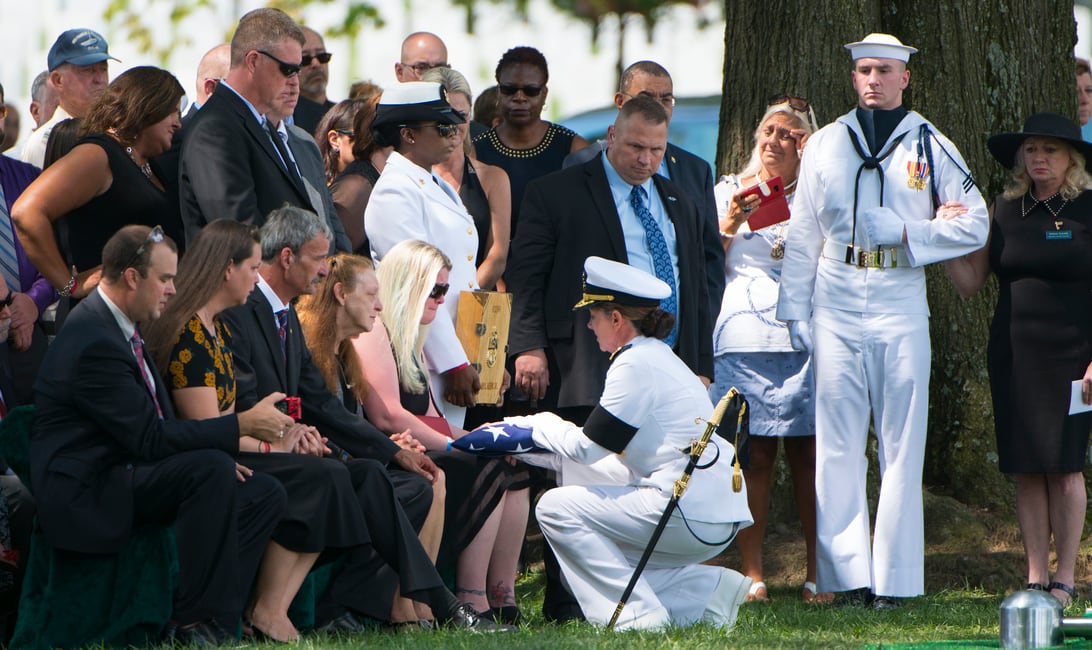A Navy board of inquiry on Thursday ruled there’s no reason to separate a lieutenant for dereliction of duty while serving on board the guided-missile destroyer Fitzgerald during a deadly 2017 collision that killed seven sailors, one of her attorneys told Navy Times.
Lt. Natalie Combs now will be honorably discharged from the sea service after 11 years in uniform.
Combs had faced two specifications, one for dereliction of duty and another for hazarding a vessel, tied to her leadership of the warship’s electronic nerve center below the bridge — what’s called the Combat Information Center, or “CIC” — on June 17, 2017, moments before the Fitz was speared and spun by the massive ACX Crystal, a Philippine-flagged cargo vessel.
Combs and her team were supposed to use advanced sensors like the Arleigh Burke-class destroyer’s SPS-67 radar to track vessels near the destroyer and relay what they detected off the coast of Japan to the watchstanders on the bridge, but Navy leaders claimed Combs failed to do that and seven junior sailors drowned.
“The board’s decision confirms what Lt. Combs and her defense team have asserted all along,” said her attorney, Corey Bean, in an email to Navy Times. "She did not commit any offense under the [Uniform Code of Military Justice], and she did not cause the collision or deaths or injuries of any Fitzgerald sailor.”
Pentagon officials did not respond to requests for comment.
The Board of Inquiry’s 3-0 decision ends a long legal saga.
Military prosecutors arraigned Combs in 2018 for two violations of the UCMJ: dereliction of duty that negligently resulted in the death of fellow sailors and the negligent and improper hazarding of a vessel.
It was a controversial call. Sifting through the evidence compiled against her, an Article 32 hearing officer previously recommended the Navy skip court-martial proceedings and send Combs to a board of inquiry to determine if she warranted remaining on duty.
In pretrial hearings, Combs’ defense attorneys chipped away at the Navy’s case against her, including finding a photo that appeared to place more blame for the collision on the merchant vessel than the Fitz’s crew.
That didn’t matter, however, because the case against her and her commanding officer, Cmdr. Bryce Benson, collapsed nine months ago under the weight of an increasing number of allegations accusing senior leaders of misconduct, especially concerns that unlawful command influence, or UCI, tainted the cases against both officers, making it impossible for them to get a fair trial.
Dubbed the “mortal enemy of military justice,” UCI occurs when superiors utter words or take actions that coerce the outcome of courts-martial, jeopardize the appellate process or undermine public confidence in the armed forces by appearing to tip the scales of justice.
Although the Navy surrendered the criminal cases, the sea service continued to push boards of inquiry for Combs and Benson.
In October, Benson learned that he wouldn’t go before a board, clearing the way for him to retire. A month later, the Navy ruled he could exit the sea service with his rank and medical benefits intact.
That left only Combs to face the administrative tribunal. While they determined her performance shortly before the collision was substandard, the board unanimously agreed there was no basis for involuntarily separating her and chose to retain her, according to Bean.
RELATED

Their decision might’ve stemmed partly from the Navy’s own secret investigation into the collision.
Provided to Navy Times, the internal probe helmed by Rear Adm. Brian Fort found that Combs’ CIC had "zero communication” with the bridge team before the Crystal loomed seemingly out of nowhere to ram the Fitz’s starboard hull.
Although listed as operational, her CIC’s SPS-67 system actually had fallen into a “degraded status,” according to Fort’s report.
Some CIC sailors didn’t appear to know how to use the equipment — much of it in various states of disrepair — and the room itself was heaped in garbage, human waste and exercise equipment, he wrote.
In the aftermath of the ACX Crystal collision, Fort found a stack of abandoned forms where Combs had been sitting.
“She was most likely consumed and distracted by a review of Operations Department paperwork for the three and a half hours of her watch prior to the collision,” he wrote.
Bean told Navy Times that the sea service “writ large clearly has an issue with training and equipping the fleet,” which means the collision had less to do with Combs “and more to do with institutional failures in the Navy.”
The Navy “should have recognized these issues and not litigated the case to the bitter end,” he added.
In a prepared statement, Combs said that she was just "grateful I’ve had the opportunity to serve my country.
"My prayers have been, and always will be, with the families of our seven sailors and my entire Fitzgerald family.”
Prine came to Navy Times after stints at the San Diego Union-Tribune and Pittsburgh Tribune-Review. He served in the Marine Corps and the Pennsylvania Army National Guard. His awards include the Joseph Galloway Award for Distinguished Reporting on the military, a first prize from Investigative Reporters & Editors and the Combat Infantryman Badge.




